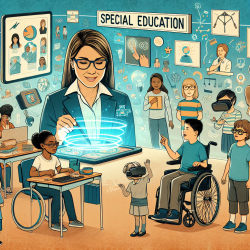The COVID-19 pandemic brought significant challenges to families of children with intellectual and developmental disabilities (IDD). This unprecedented global crisis required rapid adaptation of existing intervention models to ensure continued support for these families. One such model is parent-focused interventions, which empower caregivers to become effective agents of change in their child's development. The research article "Adapting parent-focused interventions for diverse caregivers of children with intellectual and developmental disabilities: Lessons learned during global crises" provides valuable insights for practitioners on how to implement and adapt these interventions for diverse populations.
Key Takeaways from the Research
The study highlights several critical adaptations made to parent-focused interventions during the COVID-19 pandemic. These adaptations are essential for practitioners looking to improve their skills and provide better support to families of children with IDD. Here are some key takeaways:
- Flexibility in Delivery: The transition to telehealth was necessary to continue providing services. Practitioners must be flexible and innovative in delivering interventions, utilizing both synchronous and asynchronous methods.
- Cultural Sensitivity: Adapting interventions to be culturally responsive is crucial. This includes understanding the unique challenges faced by racially, ethnically, and socioeconomically diverse families and tailoring support accordingly.
- Community Engagement: Building and maintaining relationships with community organizations can enhance recruitment and retention of diverse participants. Practitioners should immerse themselves in the communities they serve to build trust and ensure effective engagement.
- Holistic Approach: Recognize that children and families do not function in isolation. A holistic approach that considers the entire family system and provides comprehensive support is essential.
Practical Recommendations for Practitioners
Based on the research findings, here are some practical recommendations for practitioners:
- Embrace Technology: Utilize telehealth platforms and ensure families have the necessary resources and training to participate effectively.
- Adapt Assessment Tools: Use culturally responsive screening and assessment tools that accurately reflect the diverse backgrounds of the families you serve.
- Flexible Scheduling: Offer flexible scheduling options to accommodate the varying needs and commitments of families.
- Provide Training and Support: Offer additional training and support to both staff and families to navigate new technologies and intervention methods.
Implementing these recommendations can help practitioners enhance their skills and provide more effective support to families of children with IDD, especially during challenging times like global crises.
To read the original research paper, please follow this link: Adapting parent-focused interventions for diverse caregivers of children with intellectual and developmental disabilities: Lessons learned during global crises.










